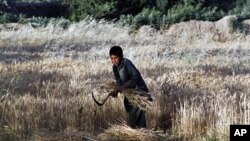The World Food Program estimates 2-3 million drought victims in Afghanistan will need food assistance this year. WFP, which is suffering from a serious shortfall in funding for its regular programs, warns many people will go hungry unless International donors come up with the cash needed to assist them.
Poor rainfall this year has hurt Afghanistan’s wheat crop. The Afghan Ministry of Agriculture, Irrigation and Livestock estimates the overall harvest will be 28 percent lower than last year’s.
The expected shortfall of nearly two million metric tons of wheat will affect some 12 million people. The World Food Program says the government will cover most of their needs. But, it notes between two and three million people will require food assistance.
WFP Deputy Country Director in Afghanistan, Bradley Guerrant says his agency would like to help these people, but it lacks the resources to do so.
He notes WFP’s three-year operation to feed more than seven million vulnerable Afghans is in trouble. The program is budgeted at $400 million a year. But, WFP has received only half that amount.
As a consequence, he tells VOA that WFP has been forced to cut the number of beneficiaries by nearly half. He says emergency relief programs are continuing, but rehabilitation or developmental activities are not.
“School feeding is not a life-saving activity. It is an activity, designed to both provide an incentive for children to attend school," said Guerrant. "There has been a lack of attention for children to go to school in the past and particularly for girls…10…So, those types of activities will have to be cut out for the time being. They are not life saving as defined by relief and recovery."
The United States is WFP's biggest donor. Guerrant says contributions have fallen significantly because of the budget impasse in Washington. He says USAID has given WFP $110 million for its Afghan operations this year, compared to $365 million it received in 2009.
He notes Afghanistan is one of the most poverty-stricken, food insecure countries in the world. And, any cuts in food assistance will simply add to the already existing problems of high child mortality and malnutrition.
He tells VOA malnutrition rates vary throughout the country. But, what he finds particularly worrying, he says, is the level of stunting, which has risen to more than 50 percent over the last few years. He says he expects the situation to become worse because of the drought.
“The quick onset, with the drought and you have lack of food, then that is where acute numbers go up. Chronic will probably maintain at these levels," said Guerrant. "How and when we see changes to the acute is yet to be known. But, you would anticipate that as less food is available, that acute numbers will go up as well.”
The World Food Program says pastoralists, who have lost livestock and subsistence farmers whose crops have failed in the north, northeast and Central Highlands are most affected by the drought.
It says these people will not have enough food to carry them through the winter and the next harvest is not expected until one year from now. WFP says it urgently needs $200 million to provide food to these people who no longer can fend for themselves.





